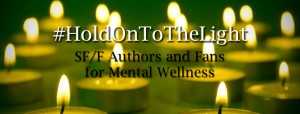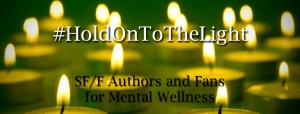
In ancient times one form of execution was to pin the accused down and pile rocks on them until they died. Until they were literally crushed and the breath squeezed out of them.
This is an excellent analogy for depression. Elements of life pile on to a person until they just cannot bear up anymore. It isn’t always constant, and for each person the “rocks” are something different, heck…for the same person the “rocks” can be different each time, but the one consistent factor is the lack of control. The inability to cast those “rocks” aside or get out from under them.
It is akin to someone suffering chronic pain. You might learn to adapt, to function past the pain, but there are times it is just too much for you and no amount of “pain” killer helps. Because it is not the “pain” that is the main problem. It is the sense of hopelessness. The persistent fear that absolutely nothing will ever change to take that “pain” away. The knowledge that people or circumstance—either knowingly or unknowingly—continue to pile on those rocks until you cannot breath.
Until you have no inclination to breath. That you are certain you are a failure at the most basic function – Living.
It is irrational, but unavoidable.
I’m going to share something with you. One rock in my cairn. Something no one would ever guess about me. Something completely at odds with anyone’s perception of me. I do not want to grow old.
Let me ‘splain.
I don’t write poetry very often anymore, but here is one I wrote about five years back that lays out my meaning in implicit detail, so there is no confusion, so there is no doubt, exactly how heavy depression can be, and how hard it can be to recognize from the outside. All but one of my friends will be blindsided by this.
May I die young and quickly
That I may never know
The burden I would be, unwanted
Were I to grow so old
Alone and not what I once was
Needing another’s care
A duty…obligation, to those not e’en my own.
May I die young and quickly
At once here, then gone.
That I be remembered fondly,
Rather than endured.
Better that than linger long,
Unwanted or alone,
Marking time upon this earth until I can go home.
Now if you know me, don’t panic. I don’t believe in suicide. I would not want to cause such trauma, pain, or heartache to those I love—or even the perfect strangers—who would potentially find me or have to deal with the aftermath. I would not be one of their “rocks”. But you know, I truly do not desire a prolonged life. Because I am terrified of being that person someone else is forced to take responsibility for. Someone else’s children, or worse, a stranger overworked and underpaid. I have seen this up close and personal, and terrified may not be a strong enough term for what I feel at the thought of ending up that way.
See, I have no children. I have a loving husband and plenty of family and I have never felt unloved. I have no doubt they will rally around me if needed, but I have always felt different and not quite connected. Always on the outside. Things would be even more uncomfortable if I were to become dependent as I wouldn’t only feel out of place, but a burden. I am sure some of them might read this and be hurt, and I’m sorry if that is the case. It is not my intention. Please recall, depression is nothing if not irrational. Again, I will repeat, I do not and have never felt unloved. That is not what this is about.
Now, I don’t share this with you because I need reassurance. That isn’t what this is about and to go there would be to overlook the importance of our message. Believe it or not I have faith that God will provide for me, though I may not be able to see the how of it right now. At the risk of being repetitive, depression IS irrational. You can’t control it. I am lucky. My depression is not a constant and is mostly hormonally triggered. We only do battle occasionally, and it has a loose enough grip I need only ride through it and remind myself the hopelessness is an illusion. This isn’t true for everyone. They face the darkness every day. Sometimes it can be managed with medication, or therapy, but many people never get help. Maybe they are ashamed, or they do not have the means, or they just don’t know where to turn. Maybe they feel they should be able to handle this on their own, or that they are weak and deserve to suffer. Maybe they just feel it won’t do any good. I know…that’s a lot of maybes, but depression is a very personal thing, each experience unique to the individual. There are as many potential reasons as there are sufferers. For me, I have remained silent to all but a few because I didn’t want to make anyone feel bad, or make them uncomfortable, or maybe, if I’m honest, because I didn’t want to appear like a failure. For whatever reason way too many do battle alone until they can battle no more.
That is what this message is about. We need to increase awareness. We need to form ranks around those we care about. The most important weapons against depression is awareness and support. Understanding from friends and loved ones, not admonitions to snap out of it. Not impatience or annoyance or platitudes that do nothing to strike a blow against the darkness. Are you ready to fight?
In the TV show Firefly there is a scene where Tracey, a character who served under Malcolm Reynolds during the Unification Wars, recounts what a soldier must do to go on:
Tracey: “When you can’t run, you crawl. And when you can’t crawl, when you can’t do that … ”
Zoe: ” … you find someone to carry you.”
 Make no mistake, depression is something people do battle with every day. Let’s be a part of their support, not a part of the problem.
Make no mistake, depression is something people do battle with every day. Let’s be a part of their support, not a part of the problem.
Danielle Ackley-McPhail is a fantasy author, editor, and publisher of eSpecBooks. Her published works include the urban fantasy, Yesterday’s Dreams, Tomorrow’s Memories, Today’s Promise, The Halfling’s Court, The Redcaps’ Queen, A Legacy of Stars, The Literary Handyman, the chapbook, Children of Morpheus, No Longer Dreams, and contributions to numerous anthologies and collections worldwide, including The Defending the Future series, The Fantasy Writer’s Companion: The Author’s Grimoire, For Better or Worse and Passings, Dark Furies, and Hear Them Roar. She is also the senior editor of the award-winning Bad-Ass Faeries series, as well as several other anthology projects.
About the campaign:
#HoldOnToTheLight is a blog campaign encompassing blog posts by fantasy and science fiction authors around the world in an effort to raise awareness around treatment for depression, suicide prevention, domestic violence intervention, PTSD initiatives, bullying prevention and other mental health-related issues. We believe fandom should be supportive, welcoming and inclusive, in the long tradition of fandom taking care of its own. We encourage readers and fans to seek the help they or their loved ones need without shame or embarrassment.
Please consider donating to or volunteering for organizations dedicated to treatment and prevention such as: American Foundation for Suicide Prevention, Hope for the Warriors (PTSD), National Alliance on Mental Illness (NAMI), Canadian Mental Health Association, MIND (UK), SANE (UK), BeyondBlue (Australia), To Write Love On Her Arms (TWLOHA) and the National Suicide Prevention Hotline.
To find out more about #HoldOnToTheLight, find a list of participating authors and blog posts, or reach a media contact, go to https://www.HoldOnToTheLight.com and join us on Facebook https://www.facebook.com/WeHoldOnToTheLight












